Toruń Logic Group: Logica Copernicana Seminar
21.10.2025
The potential of paraconsistent epistemology
University of Campinas, Brazil
Abstract. Modal extensions of paraconsistent logics have been proposed by
several authors. Independently, the three-valued paraconsistent logic
LFI1 has been investigated with distinct motivations. As a member of
the Logics of Formal Inconsistency (LFIs) family, LFI1 internalizes
the notions of consistency and inconsistency within its language and
is particularly suited for modeling evolutionary databases. Notably,
LFI1 is equivalent to the system J3—a natural three-valued
paraconsistent logic designed to meet Stanisław Jaśkowski’s
foundational requirements.
This paper extends J3 (in its LFI1 formulation) by introducing
modalities to analyze epistemic and doxastic systems based on LFI1,
thereby laying the foundation for a paraconsistent epistemology that
incorporates flexible notions of knowledge and belief. We show how
agents capable of tolerating contradictions can reason coherently,
emphasizing that while paraconsistent systems allow for the
possibility of contradictions, they do not inherently endorse them.
This framework mirrors the scientific process, where provisional
contradictions arise during theory construction without leading to
triviality, and thus justifies the development of a rigorous
paraconsistent epistemology.
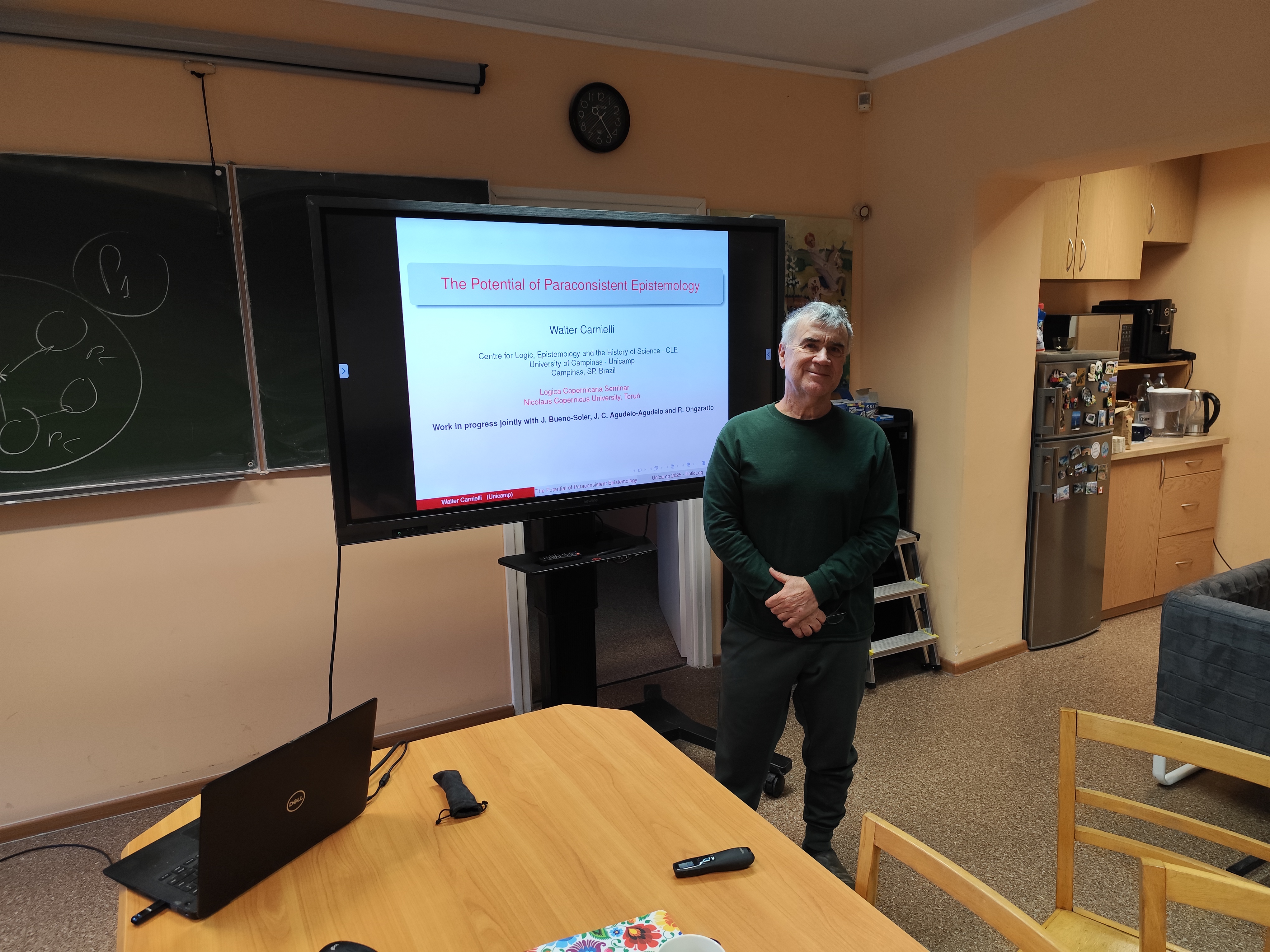
15.10.2025
The dynamics of paraconsistent reasoning
Rafael Ongaratto
Institut de Recherche en Informatique de Toulouse, France
University of Campinas, Brazil
Abstract. In this talk, I introduce the logic PALFI1, a paraconsistent dynamic epistemic logic based on the three-valued logic LFI1. By discussing the notions of change and knowledge in the framework of paraconsistent logic we engender new ways of thinking about knowledge in epistemic logics, and also illuminate the intricate connection between paraconsistency and change. Using PALFI1, it is possible to give a satisfactory answer to Kripke’s Paradox of Knowledge, and also to represent the evolution of informational environment with multiple agents.
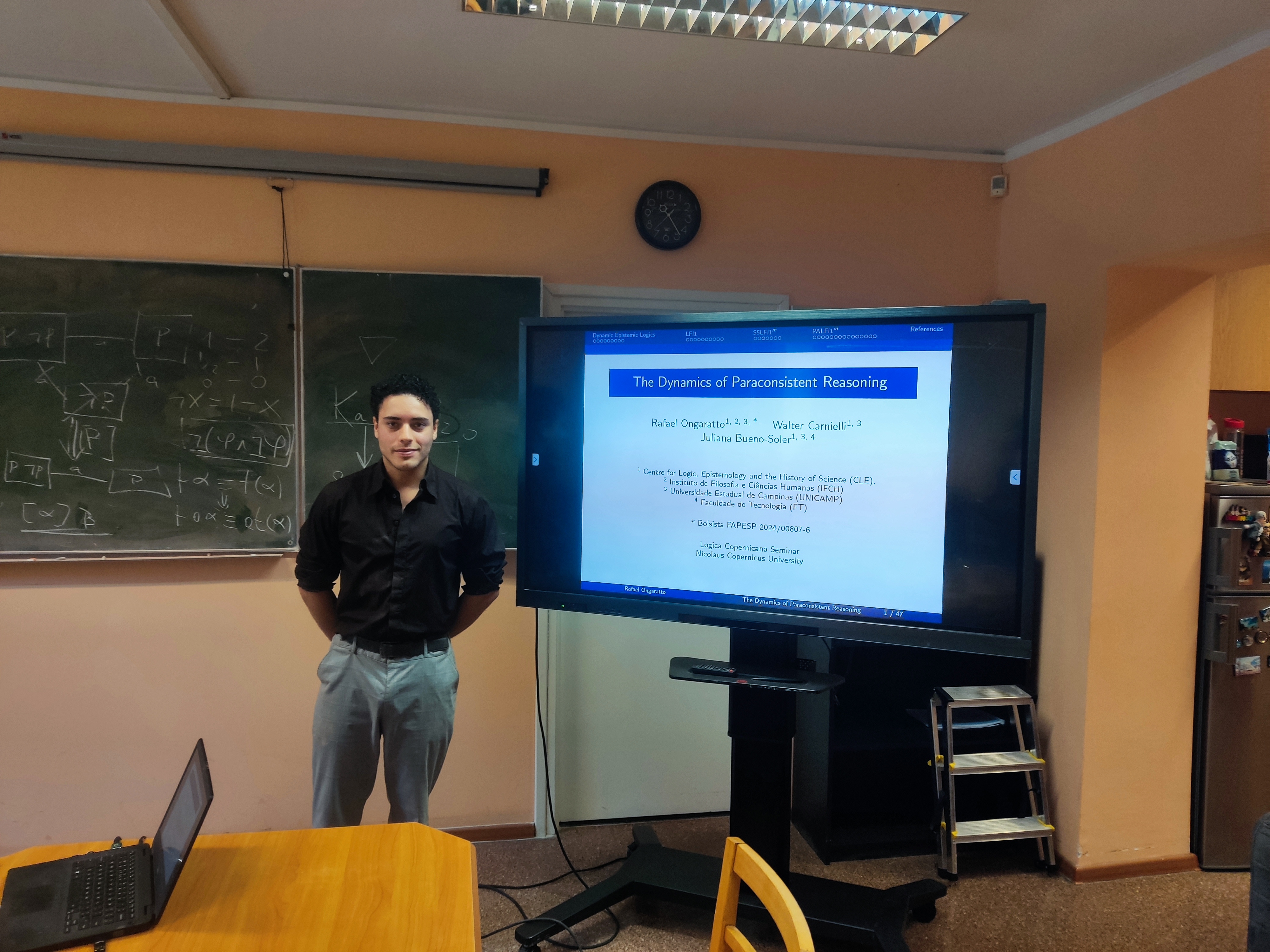
14.10.2025
Negation, denial, and inconsistency: Informal and formal perspectives
University of Campinas
Brazil
Abstract. While the Western tradition often treats the elusive notion of negation as secondary to affirmation, Eastern traditions regard emptiness or non-being as more fundamental. This talk examines negation, denial, consistency, inconsistency, evidence, and counter-evidence through contemporary systems such as intuitionistic, paraconsistent, and modal logics, as well as logics of evidence and truth, trying to illuminate the structure of negation and its broader role in reasoning.
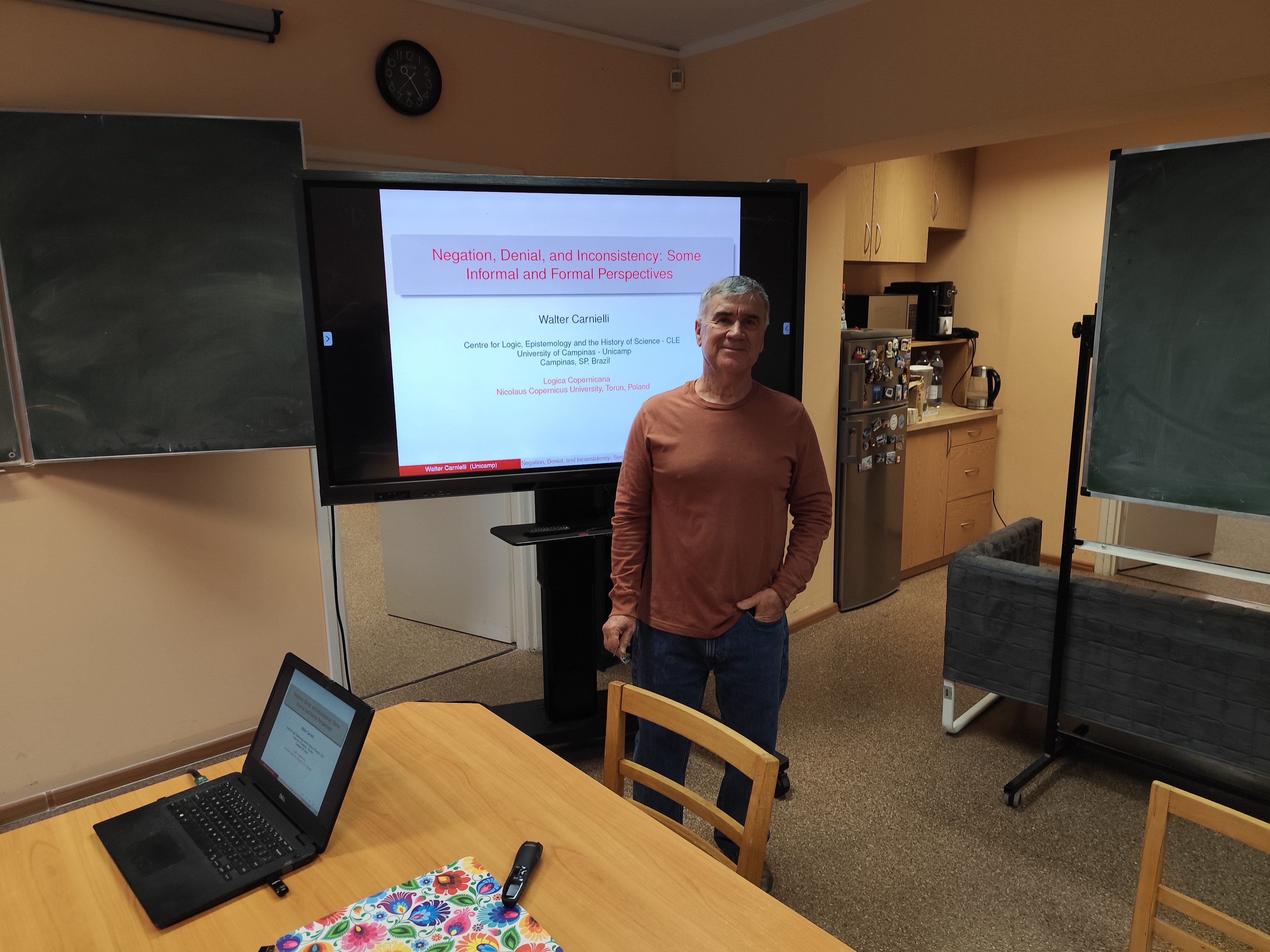
07.10.2025
On a paraconsistent and paracomplete non-deterministic fuzzy logic
Federal University of Minas Gerais
Brazil
Abstract. In this talk, I present the guiding ideas of a paraconsistent and paracomplete fuzzy logic designed to represent the degrees of evidence, positive and negative, available for a sentence A.
The proposal aims to capture paraconsistent, paracomplete, and classical scenarios within a fuzzy semantics.
A preliminary investigation of the semantic clauses for the binary connectives of Godel's fuzzy logic and product logic suggests that they align well with the interpretation in terms of evidence.
Regarding negation, the starting point is to consider it as a primitive symbol, that is, ¬A is not
defined as A→F, where F is a formula that is always assigned the value 0. A fuzzy valuation is a function v from the set of literals (formulas p and ¬p) to [0,1], thus allowing for a free assignment of values to p and ¬p.
The semantics of negation, therefore, is non-deterministic (i.e. it is not truth-functional).
Double negation is valid because it is assumed that A and ¬¬A have, so to speak, the same meaning – that is, positive evidence for ¬A amounts to negative evidence for A, and positive evidence for A amounts to negative evidence for ¬A.
In addition, all directions of De Morgan’s laws are valid, and it is desirable that the equivalence between ¬(A→B) and A ∧ ¬B holds, as it does in Nelson’s N4.
The idea is to combine the original clauses of the binary connectives with negative clauses similar to those of N4, in order to obtain a fuzzy treatment of scenarios with gaps and gluts suitable for the interpretation in terms of degrees of evidence.
It is likely that the success of this proposal will depend mainly (although not exclusively) on the behavior of negation, which must be consistent with the usual properties of fuzzy operations, defined by t-norms and t-conorms.
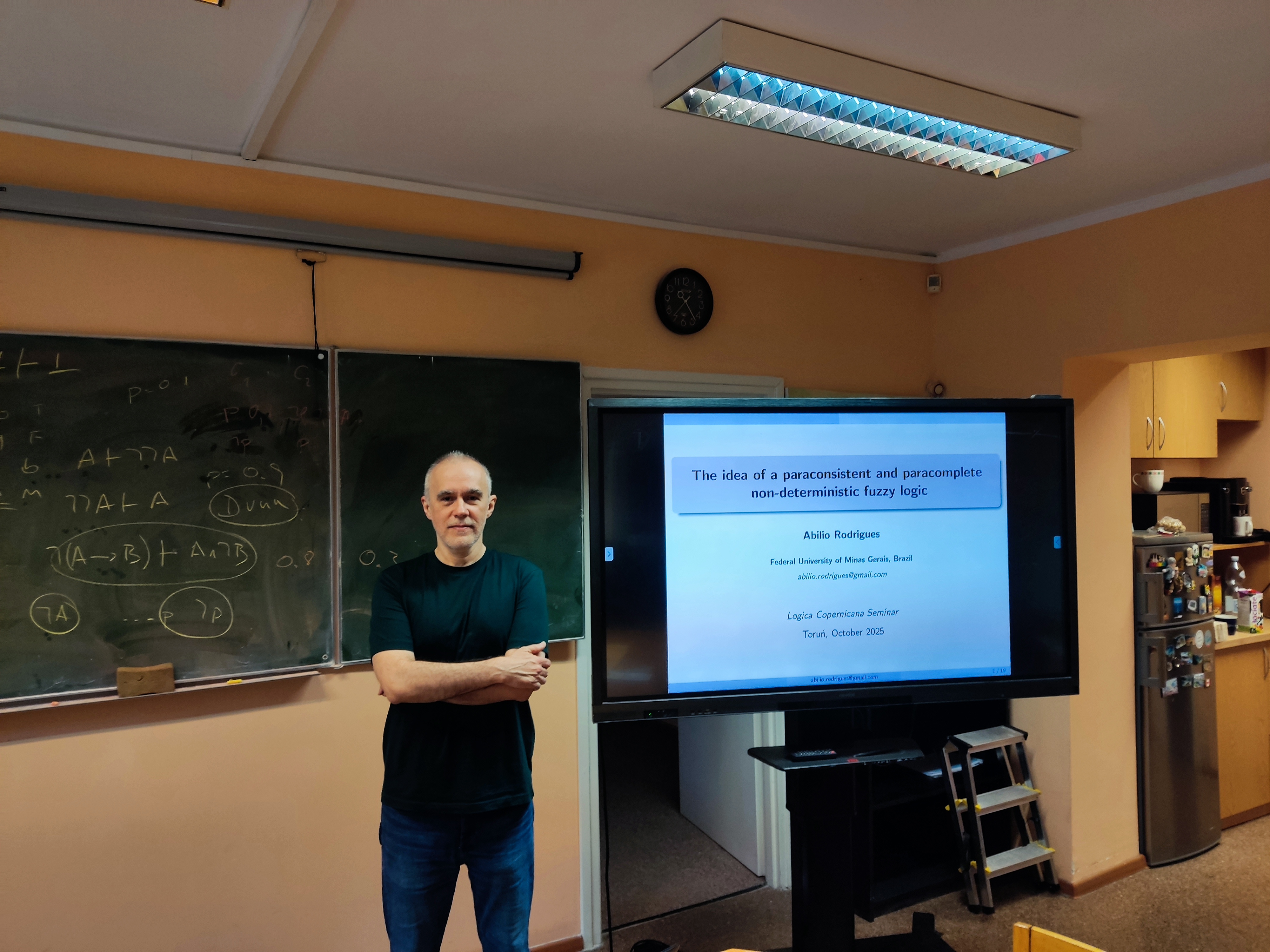
29-30.09.2025
Chinese-Polish Workshop on Applied Logic
Nicolaus Copernicus University in Toruń
29-30 September 2025
Venue: Department of Logic, Nicolaus Copernicus University in Toruń, ul. Stanisława Moniuszki 16/20, 87-100 Toruń
The 5th edition of Chinese-Polish Workshop on Applied Logic aims to push forward the interaction between Chinese and Polish logicians. It focuses on epistemic, deontic logic and other philosophical logics. Everyone who has interest in logic is welcome.
Organizers:
Piotr Kulicki, Faculty of Philosophy, The John Paul II Catholic University of Lublin
Michał Oleksowicz, Department of Logic, Nicolaus Copernicus University in Toruń
Participants:
Tomasz Jarmużek, Department of Logic, Nicolaus Copernicus University in Toruń
Fengkui Ju, Beijing Normal University, China
Mateusz Klonowski, Department of Logic, Nicolaus Copernicus University in Toruń
Piotr Kulicki, Faculty of Philosophy, The John Paul II Catholic University of Lublin
Kai Li, Shanxi University, China
Yiyan Wang, Shanxi University, China
Jialiang Yan, Tsinghua University, China
Wei Zhao, Shanxi University, China
During the workshop: talks, discussion on joint projects (among others, Polish-Chinese Lab for Collective Reasoning) and research aims.
Program
Monday, 29 September
9:30-9:45 Piotr Kulicki: Opening: Chinese-Polish Workshops on Applied Logic – brief history
and perspectives
9:45-10:30 Tomasz Jarmużek: Classicization of anti-classical logics: the case of connexive
implication
10:30-10:45 Break
10:45-11:30 Fengkui Ju: Strong/weak historical/temporal necessities, and a logical theory of
them in branching time
11:30-12:15 Jialiang Yan: Ordered disjunction [online]
12:15-13:30 Lunch
13:30-14:15 Wei Zhao: Belief revision with satisfaction measure
14:15-15:00 Yiyan Wang: Collective agency and coalitional power in games
15:00 Discussion over coffee
Dinner in the city in the evening
Tuesday, 30 September
9:30-10:15 Kai Li: What are norms? Sanctions or imperatives
10:15-11:00 Piotr Kulicki: The challenges of deontic logic
11:00-11:30 Break
11:30-12:15 Mateusz Klonowski: Tableaux for logics of content relationship and set-assignment semantics
12:15 Closing over lunch
.jpg)
.jpg)
.jpg)
.jpg)
.jpg)
.jpg)
.jpg)
.jpg)
28.02.2025
A Stone-like relational duality for Pseudo-Inference algebras
National University of Central Buenos Aires
Argentina
Abstract. In classical Euclidean geometry, a point is considered a fundamental primitive notion.
In contrast, the region-based theory of space (RBTS) takes regions (abstracted physical bodies) as primitives, along with basic mereological relations such as part-of, overlap, and underlap.
This approach allowed De Laguna [dL] to introduce Contact Algebras, which have become a milestone in the study of RBTS.
Later, Ivanova [I] introduced Extended Contact Algebras in an effort to provide structures with a more expressive language, enabling the expression of the predicate of internal connectedness
of a region—interpreted as the existence of cavities in a physical body (see [PH] for details).
Inspired by the approach of [CJ] for subordination algebras, in this talk, we introduce Pseudo-Inference algebras (PSI-algebras, for short).
These structures are Boolean algebras equipped with a ternary monotone operator that preserves binary joins in the first two coordinates, satisfies certain axioms, and serves as a generalization of Extended Contact Algebras.
Our aim is to establish a Stone-type relational duality for PSI-algebras.
Acknowledgement. This is an ongoing project in collaboration with Rafał Gruszczyński, Paula Menchón, and Sergio Celani as part of the MOSAIC Project 101007627, funded by the European Union’s Horizon 2020 research and innovation program under the Marie Sklodowska-Curie Actions.
References:
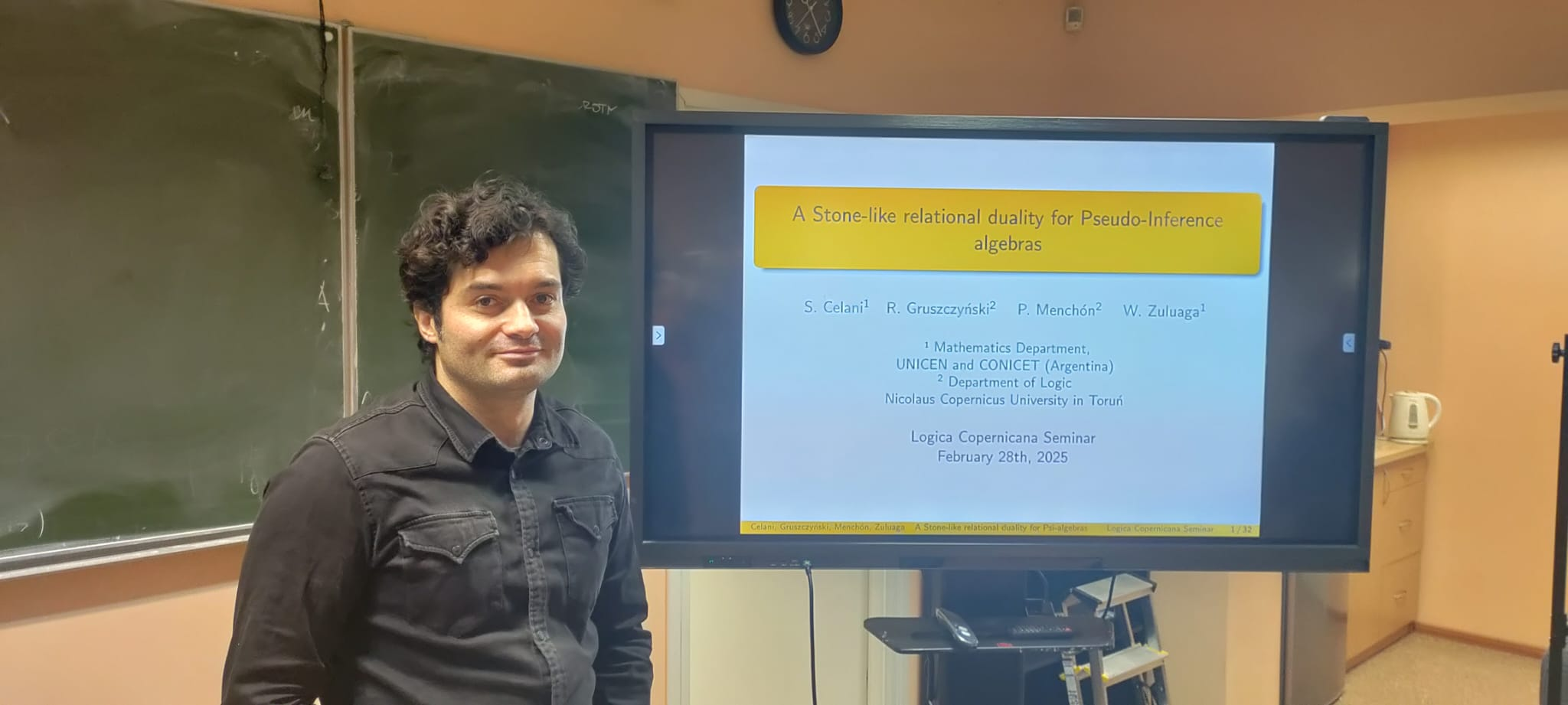
25.02.2025
A logic for instrumental obligation
Tsinghua University
China
Abstract. In this talk, I will present a logic based on causal inferences to formally capture the concept of instrumental obligation. We establish causal deontic models that extends causal models with priority structures, in which both the instrumental and deontic meaning of an obligation can be represented. In the model, instrumental obligation is defined as a derived notion through intervention formulas in causal reasoning, where an action is considered instrumentally obligatory if it is the best way to achieve the goal. We provide a sound and complete axiomatic system and show that the logic is NP-complete. The concept of instrumental permission and multi-goal instrumental obligation are also taken into account. This talk is based on a joint work with Qingyu He.

19.11.2024
Logika podróży (Logic of journey)
Institute of Philosophy and Sociology
Poland
Abstract:
(PL) Czysta obserwacja jest sensowna tylko w takim stopniu w jakim może być sensowna postmodernistyczna dekonstrukcja.
W procesie poznania koniecznym pośrednikiem pomiędzy obserwacja a stojącą za nią ontologiczna semantyką jest logika.
Celem wykładu jest prezentacja szeregu przykładów ontologicznej semantyki zbudowanej na bazie obserwacji przy użyciu logiki jako narzędzia służącego poznaniu.
(ENG) Pure observation is only meaningful to the extent that postmodern deconstruction can be meaningful.
In the process of cognition, the necessary intermediary between observation and the ontological semantics behind it is logic.
The aim of the lecture is to present a series of examples of ontological semantics built on the basis of observation using logic as a tool for cognition.

13.06.2024
Visual Perception, Affordences, and Concepts
Brock University
Canada
Abstract. Over a period of fifty years, the psychologist J.J. Gibson developed an “Ecological Approach to Visual Perception” that was radically different from the prevailing views of the time – and, to some extent, from those of today.
The term ecological in the sense used by Gibson pertains to the natural environment, to the “everyday things” of the acting individual – no molecules, no galaxies, no nanoseconds, no eons. Gibson claims that the observer
and the observed are an inseparable pair, related by affordances:
‘‘The affordances of the environment are what it offers the animal, what it provides or furnishes, either for good or ill...
I mean by it something that refers to both the environment and the animal in a way that no existing term does. It implies the complementarity of the animal and the environment.”
Though controversial, Gibson’s concept of direct perception and affordances was applied in many areas, for example, to theories of design and to robot control architecture that enables a robot to perceive more interaction possibilities
than a traditional architecture that relies on appearance–based object recognition alone. In the presentation I shall outline Gibson’s theory and the concept of affordances, and I will sketch a connection to a theory of concepts.
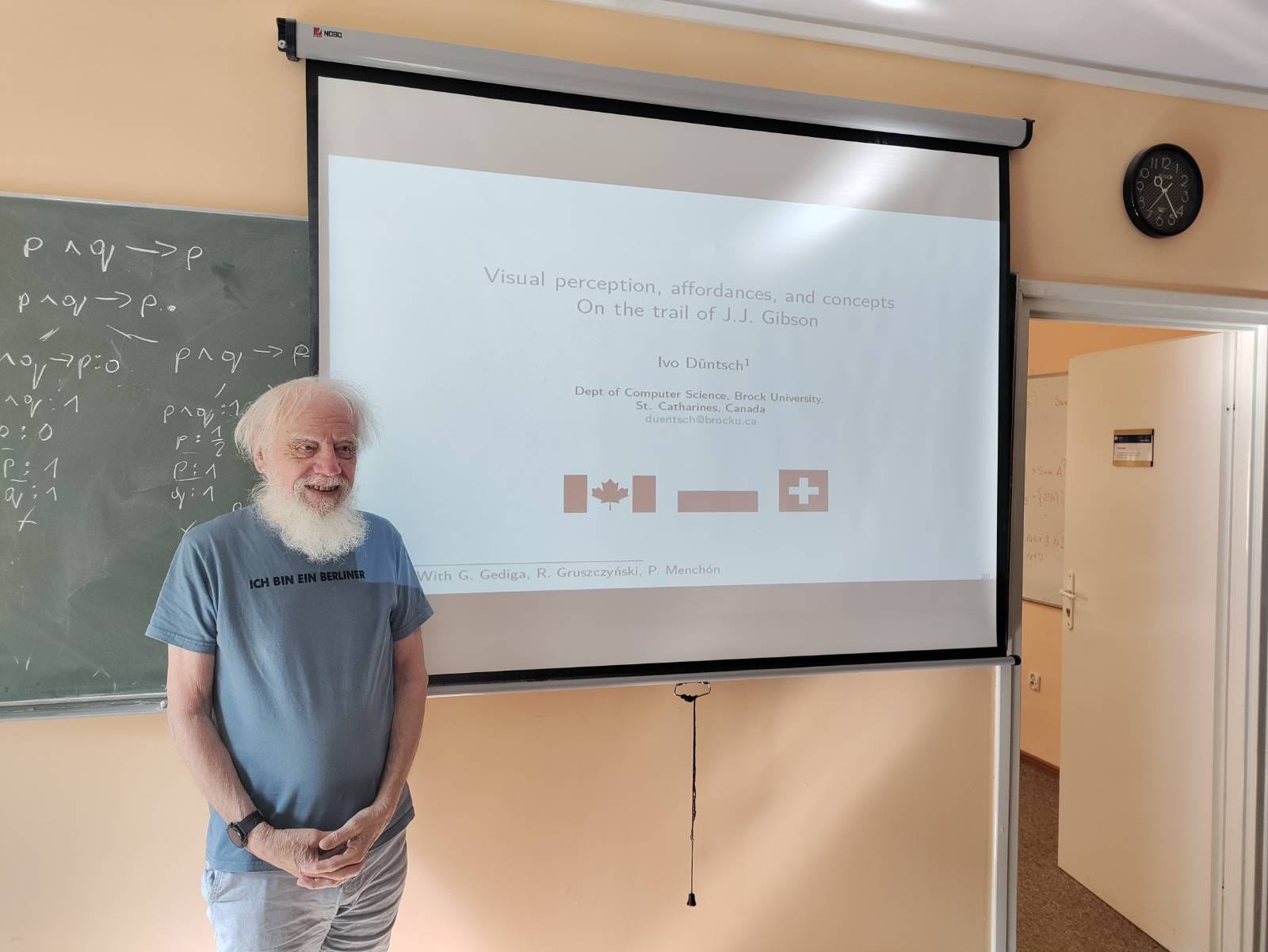
15.04. and 16.04.2024
Paradoxes and Truth in a Logic of Sentential Operators
Department of Informatics
University of Bergen
Norway
Abstract. We show how to extend any classical (first or higher order) language with the sentential quantifiers and operators.
Graph-based semantics coincides with the classical one for the classical sublanguage. The self-referential capabilities allow to express paradoxes, which arise due to unfortunate definitions of operators.
They do not entail explosion, differing thus from the contradictions. For such an extension of FOL, a complete reasoning system is obtained by adding to Gentzen's LK two rules for the sentential quantifiers.
For any given structure, an operator defining the semantics can be introduced, allowing to define a nontrivial truth operator.
This extension entails unrestricted Convention T and compositionality axioms. It is also semantically conservative, so --
unlike in the standard setting with the arithmetized syntax and truth predicate - every consistent theory can be augmented with the truth operator without introducing any inconsistency.
A general form of such an extension (not relative to any structure) is under investigation, and the second part of the presentation will address some open issues.
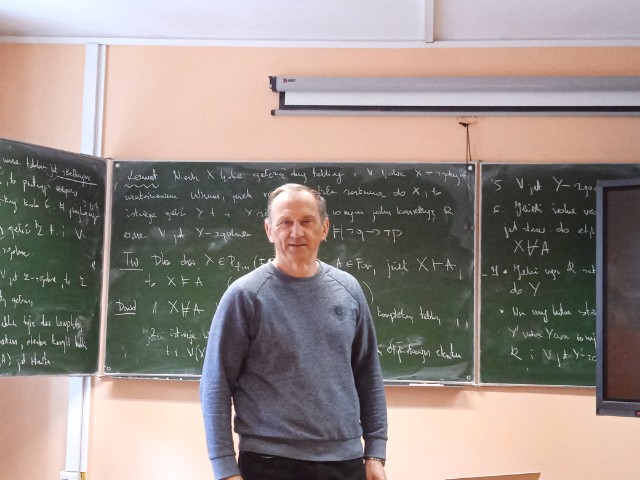
12.03.2024
Quantifiers in Connexive Logic
Ruhr-Universitat Bochum
Germany
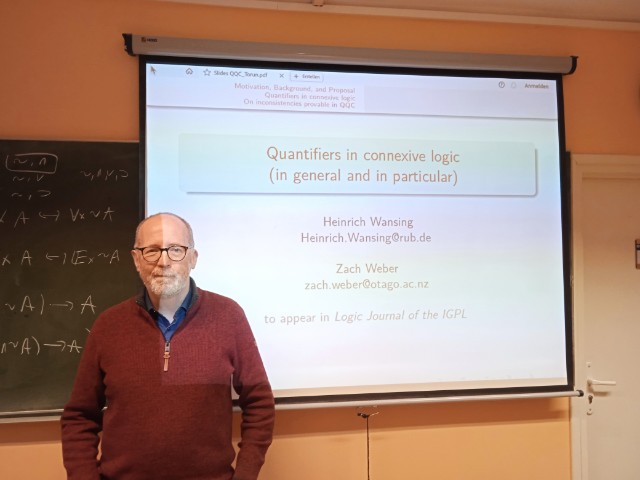
11.03.2024
Logical Bilateralism and Non-Trivial Negation Inconsistency
Ruhr-Universitat Bochum
Germany
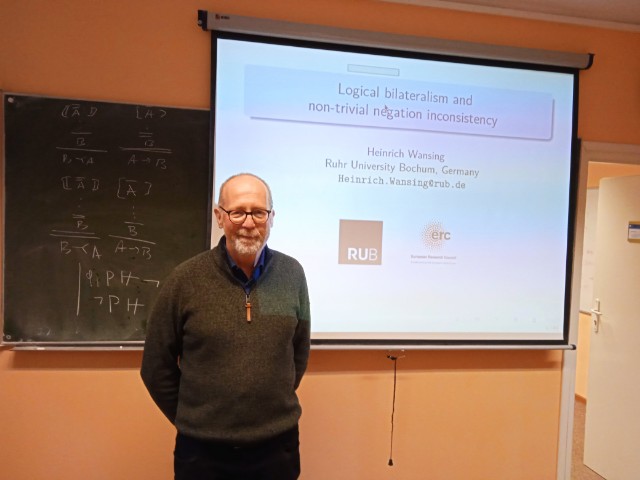
04.03.2024
On Two Seminal Approaches to Paraconsistency: da Costa and Jaśkowski
Federal University of Minas Gerais
and University of Campinas
Brazil
Abstract. The aim of this paper is to analyze and compare two seminal approaches to paraconsistency, proposed by Jaśkowski (1948) and da Costa (1963). This talk corresponds to the first part of the paper and is devoted to technical, conceptual, and historical aspects of the work of da Costa's and his collaborators on paraconsistent logics. (Joint work with Marek Nasieniewski.)
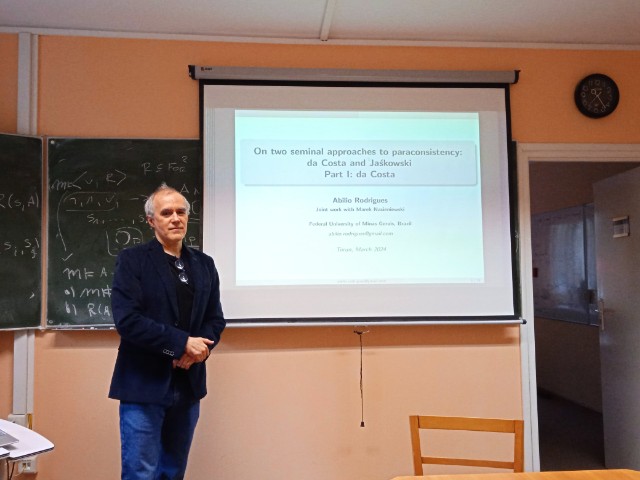
17.10.2023
Inconsistency-Tolerant Nonmonotonic Logics: In Search of New Approaches to Inconsistency-Adaptive Logics
Federal Institute of Para
Brazil
Abstract. In this talk, I will introduce a new family of first-order nonmonotonic paraconsistent logics (dubbed inconsistency-tolerant nonmonotonic logics). Based on a novel approach to inconsistency-adaptive logics, I will show that inconsistency-tolerant nonmonotonic logics are capable of overcoming various shortcomings discovered in first-order extensions of nonmonotonic paraconsistent logics introduced by authors such as Graham Priest and Diderik Batens. The talk is based on joint work with Christian StraSer (Ruhr-University Bochum).
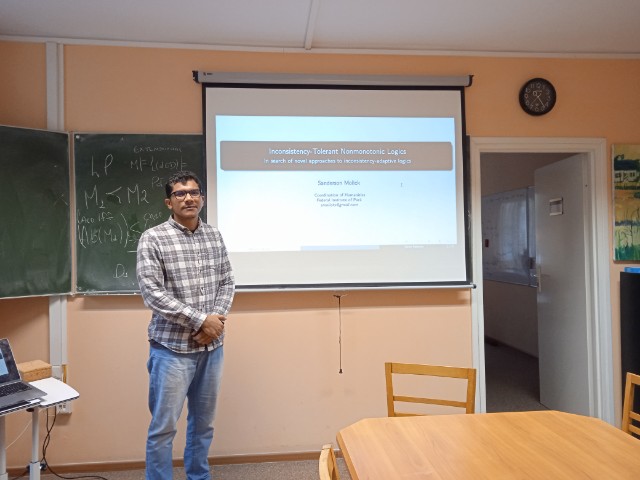
17.10.2023
What do 'Evidence' and 'Truth' Mean in the Logics of Evidence and Truth
Federal University of Minas Gerais
and University of Campinas
Brazil
Abstract. Logics of evidence and truth (LETs) are paraconsistent and paracomplete logics that extend the logic of first degree entailment, also known as Belnap-Dunn 4-valued logic, with a classicality operator that recovers classical logic for sentences in its scope.
The aim of this talk is twofold. First, I present and discuss some recent developments in the logics of evidence and truth,
namely, finitely-valued propositional versions and first-order versions with Kripke-style semantics.
Second, in order to answer some criticisms raised against LETs, I explain the notions of evidence and information underlying the intuitive interpretation of LETs, and also
clarify in which sense the deductive behavior of conclusive evidence is expressed in terms of preservation of truth.
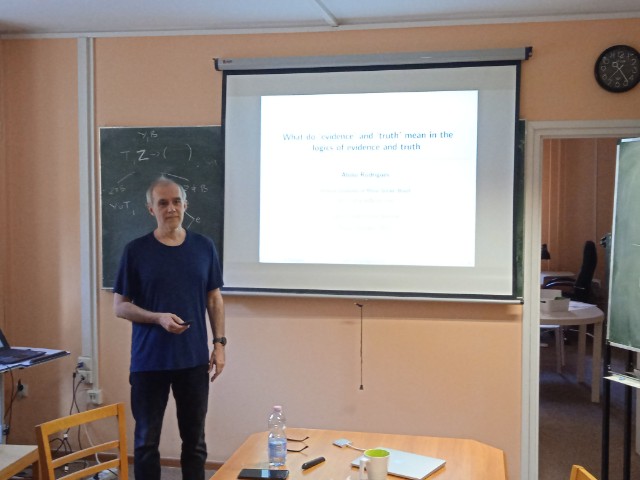
23.05.2023
Models of Set Theory and the Torunian Plan
University of Oslo
Norway
Abstract. In this presentation, I will introduce my MSCA project entitled "Unifying Classicality and Non-classicality", which will be carried out at the University of Oslo from 2023 to 2025. The primary objective of this project is to merge the realms of classicality and non-classicality within the domains of mathematical logic and the philosophy of logic. This project consists of two distinct parts. Firstly, our aim is to unify the classical and non-classical foundations of mathematics using a set-theoretic framework. What sets our approach apart from previous attempts is our belief that only an algebraic methodology possesses the necessary generality to accomplish such a task. Secondly, we intend to extend our reconciliation of classicality and non-classicality into the realm of philosophy of logic and philosophy of set theory. Specifically, we plan to unify the study of set-theoretic and logical pluralism. This integration holds potential for generating fresh insights in both fields of study. Lastly, I would like to highlight the potential for future research by establishing connections between the first part of the project and the field of relating semantics. By exploring these connections, we anticipate uncovering valuable avenues for further research.
05.05.2023
Expressive AI for Rational Arguments, Ethical Decision-Making, and Cognitive Modeling
University of California
Berkeley, USA
Abstract. Recent implementations of highly expressive logical embeddings are pushing boundaries of automated reasoning systems. This prompts applications of sophisticated rule-based AI for intelligent automated agency. My talk focuses on three applications. First, the research in computational philosophy: the implementation of non-classical logics in automated proof assistants allows to mechanize complex reasonings involving e.g. metaphysical concepts and ethical theories; this fosters concrete and effective multidisciplinary dialogues. Second, I present how normative and legal theories can be effectively implemented in interactive reasoning environments: this is the condition for building automated ethical governors for decision-making processes coming from other AI systems. Third, the application to cognitive models: in collaboration with neuroscience-informed cognitive research on belief, I outline expressive modeling for believing processes, with emphasis on consistency maintenance and decision-makings in agents and communities.

16.12.2022
On a Logico-Algebraic Approach to AGM Belief Revision Theory
Universita degli Studi di Teramo
Italy
Abtsract. In this talk we investigate an algebraic approach to AGM (Alchourrón, Gardenfors, Makinson) logic of theory change by using the tools of abstract algebraic logic. Specifically, we generalize the notions involved in the definition of epistemic operators, in particular contraction, to arbitrary finitary propositional logics, and we show how to switch from a syntactic-based approach to a semantic one. This allows to build a solid bridge between the validity of AGM postulates in a propositional logic and specific algebraic properties of its intended algebraic counterpart. Such a connection deserves particular attention when we deal with maxichoice contractions. We close the talk by discussing open problems and further developments of the above framework.
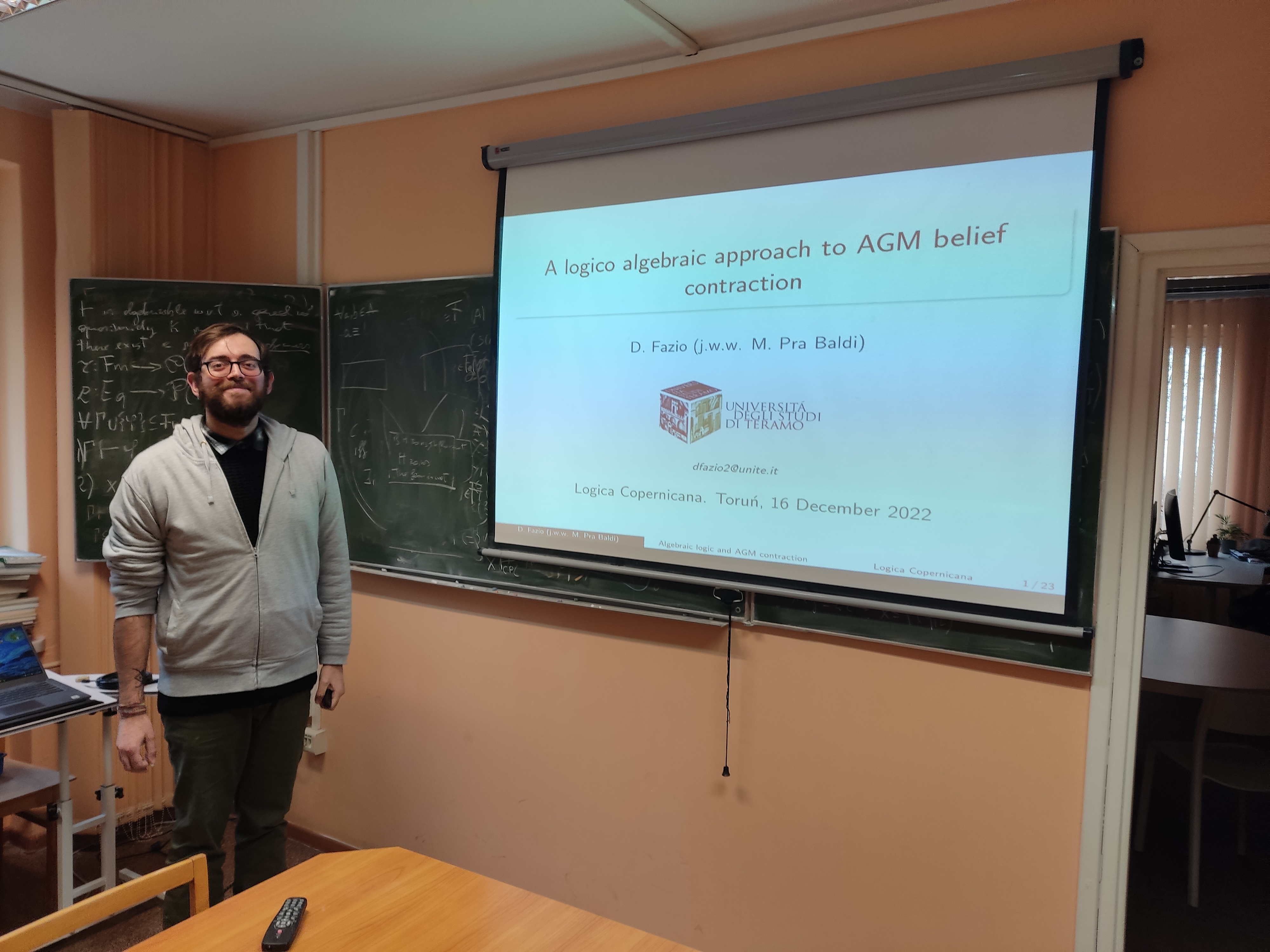
21.11.2022
Czy koncepcja falsyfikacjonizmu Poppera stosuje się do testowania hipotez w psychologii?
(Does Popper's concept of falsificationism apply to hypothesis testing in psychology?)
Tytus Sosnowski
Nicolaus Copernicus University in Toruń
Poland
04.10.2022
On the Proof Theory and Correspondence Theory of Atomic and Molecular Logics
University of Rennes
France
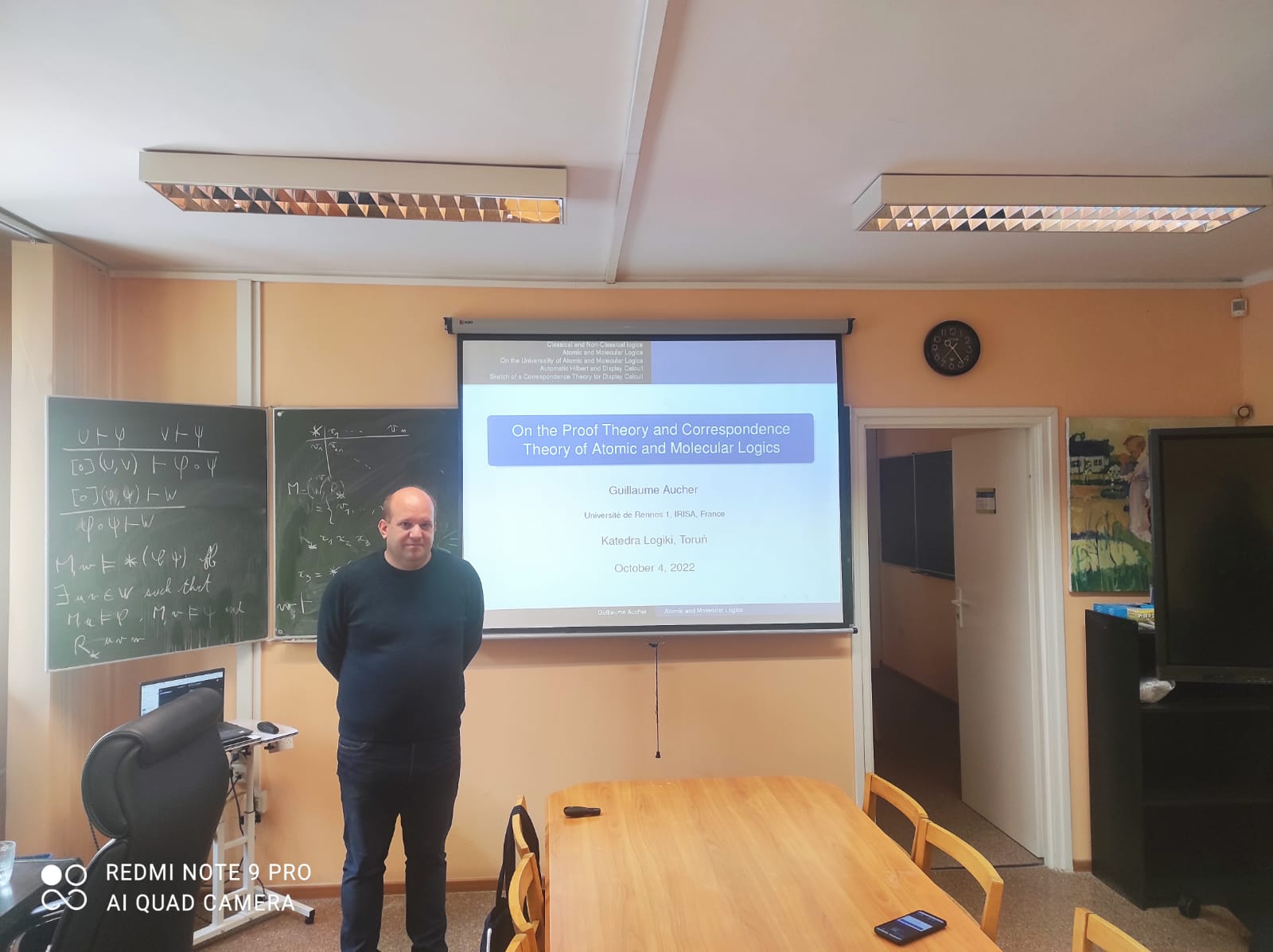
19.09.2022
Generalised Explosion and Stratified Paraconsistency
Indraprastha Institute of Information Technology-Delhi
India
Abtsract. Paraconsistency is commonly defined and/or characterized as the failure of a principle of explosion. The various standard forms of explosion involve one or more logical operators, among which negation is the most frequent. In this talk, I will explore the possibility of describing notions of paraconsistency via the failure of principles of explosion that do not involve a negation operator. The questions thus raised are the following. Is the negation operator essential for defining paraconsistency? More broadly, is it possible to describe a notion of paraconsistency that is independent of connectives? I will present two such notions of negation-free paraconsistency, one that is entirely independent of connectives and another that uses a conjunction-like binary connective that we call 'fusion'. Next, I will discuss a 'quasi-negation' that can be derived from one of these notions of negation-free paraconsistency. Finally, I will end with a relativized/stratified notion of paraconsistency.
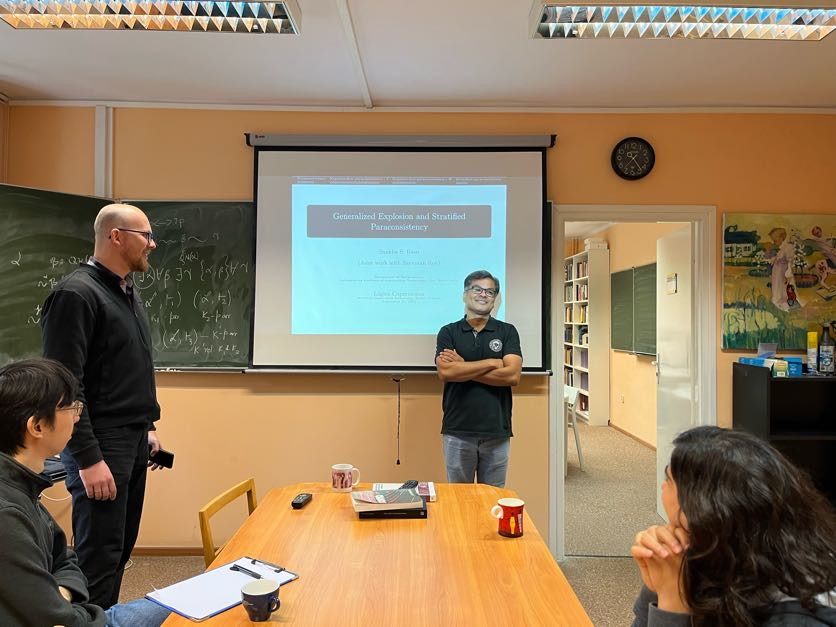
10.09.2022
A Polynomial Calculus Representing Plain Fibring of Matrices
Centre for Logic, Epistemology and the History of Science - CLE
and School of Technology
University of Campinas-Unicamp
Brazil
Abtsract. Our aim is to propose a method which produces an algebraic polynomial representation for a fibred product of logics L1 + L2, starting from the algebraic representation of the components L1 and L2. As there are different methods to combine logics, we expect that to each one there will be a corresponding method to combine polynomial ring calculi, introduced by W. Carnielli. In this talk we restrict our analysis to the method of plain fibring,,mproposing a method for combining polynomial calculi called P F-Polynomial Calculus that preserves the product obtained by plain fibring.
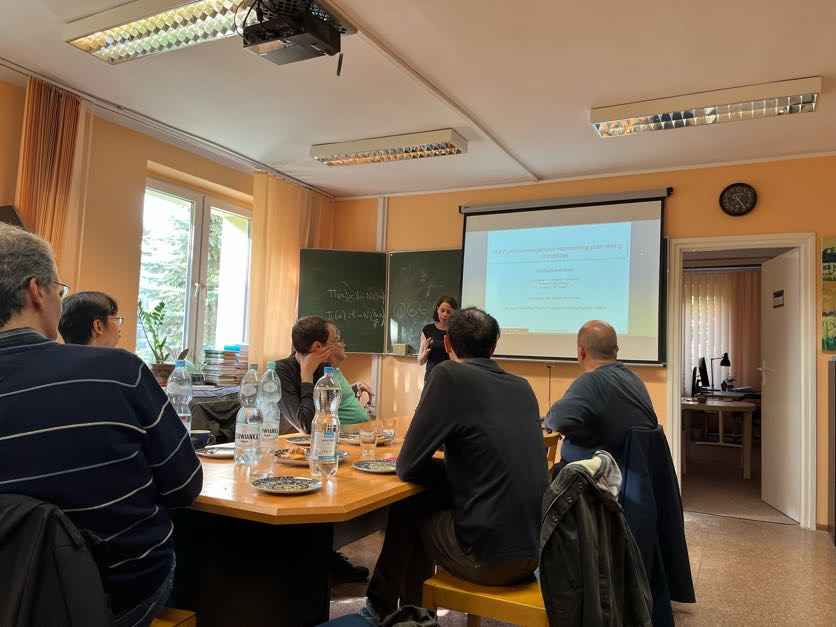
10.09.2022
Credal Calculi via Paraconsistent Possibilistic Logics
Centre for Logic, Epistemology and the History of Science - CLE
University of Campinas-Unicamp
Brazil
Abtsract. This paper defends the use of possibility and necessity models based on the Logics of Formal Inconsistency, taking profit of their expressivity in terms of the notions of consistency (◦) and inconsistency (•). It is shown, by revisiting a paradigmatic example, how paraconsistent possibility and necessity reasoning in general can attain realistic models for artificial judgement, which we call credal calculi, with appealing consequences.
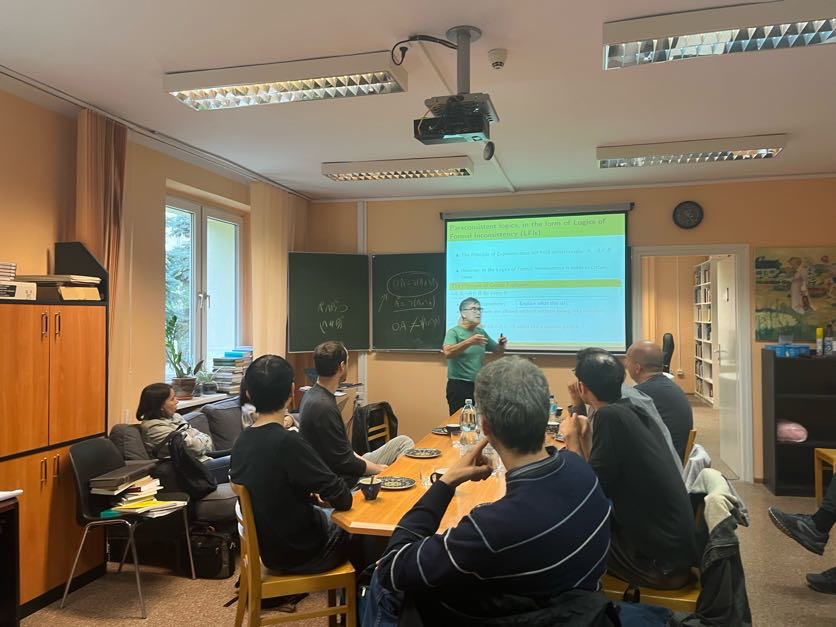
09.09.2022
Enlarging Popper’s Conditional Probability as a Primitive Notion: Towards General Non-Standard Theories of Probability
Centre for Logic, Epistemology and the History of Science - CLE
and School of Technology
University of Campinas-Unicamp
Brazil
Abtsract. There is a continuing discussion in the literature around the concept of conditional probability because concepts such as dependence and independence between events, which can be derived from the definition of conditional probability are sometimes paradoxical. I discuss the proposal for an extension of Popper’s axiomatization of conditional probability by employing the language of paraconsistent logic, even if Popper’s account is autonomous. The results of this move will, at the same time, tighten the connections between paraconsistency and the Popperian philosophy, and offer an alternative account of paraconsistent probability.
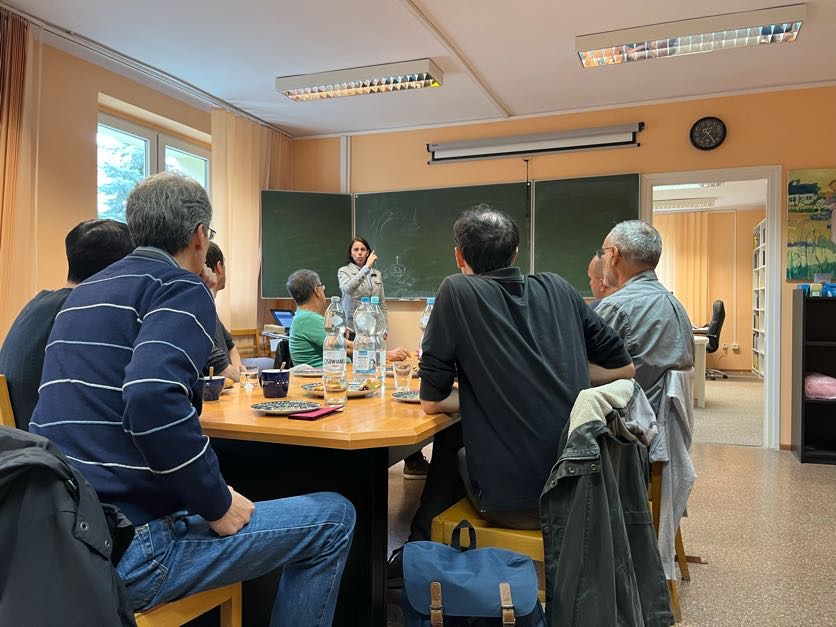
09.09.2022
The Brazilian Paraconsistency Program: A Survey
Centre for Logic, Epistemology and the History of Science - CLE
University of Campinas-Unicamp
Brazil
Abtsract. In this talk I summarize the main research trends of the last decade of the Group of Theoretical and Applied Logic Group of the Centre for Logic, Epistemology and the History of Science at the University of Campinas.
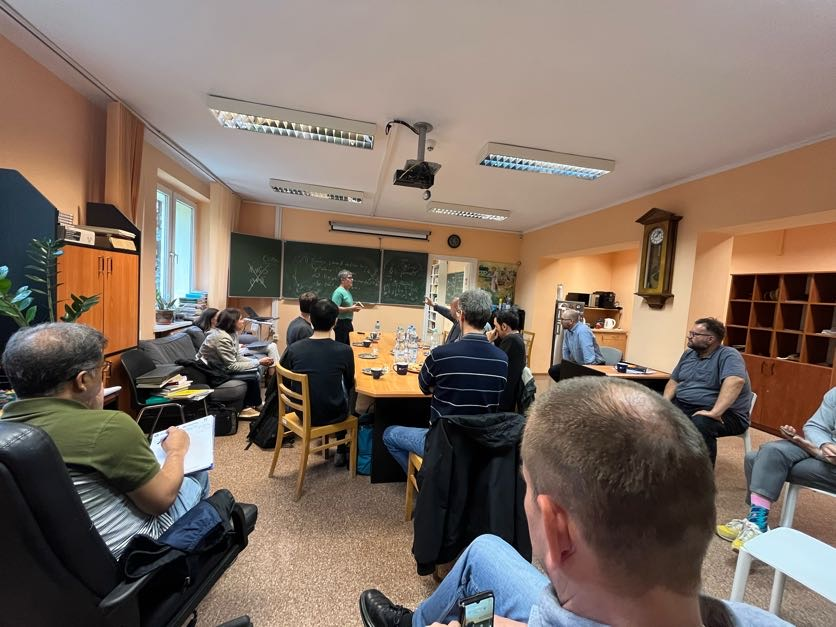
09.09.2022
The Principle of Ariadne and the Axiom of Choice
Centre for Logic, Epistemology and the History of Science - CLE
University of Campinas-Unicamp
Brazil
Abtsract. This talk surveys some results on combinatorial aspects of infinite Ramsey-type problems inspired by finite properties, and intends to explain the relevance of an alternative set-theoretical principle, the so-called Principle of Ariadne. This principle is a rival of the Axiom of Choice, can be consistently added to the usual axiom stock of ZF set theory under certain conditions. Such a new axiom, which preserves all the finite contents of mathematics but deviates from the standard in the infinite contents, may help us to understand the finite-infinite divide in mathematics, making clear that there is more than one way to generalize from finite principles of order (or choice) to the infinite. In other words, several infinite principles are possible starting from the same finitary content.
